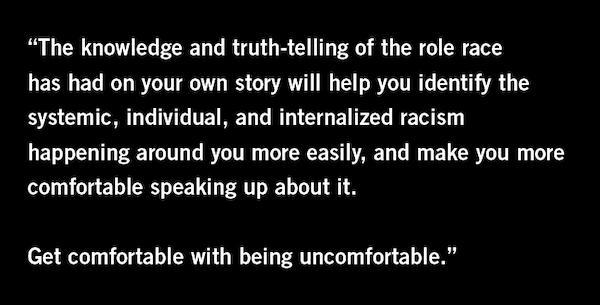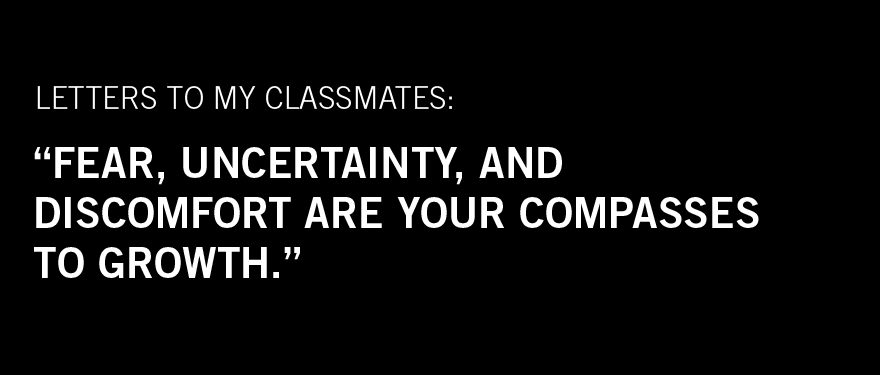Black students in our community have spent the last few weeks grappling with the weight of a devastating truth: that our country and society has undeniably and systemically failed Black communities – and the false narrative that being well educated, professionally accomplished and palatable enough for predominantly white spaces is still not be enough to keep Black people safe – and there isn’t a job title or degree in the world that can protect Black communities from institutionalized and systemic racism.
Members of the HBS African American Student Union have written a series of Letters to our Classmates in an effort to elevate this message: “On behalf of your Black classmates: we’re not okay, and you shouldn’t be either”. The letters are meant to remove the onus too often placed on Black students to discuss and teach fellow classmates about the lived experiences of being Black in America. The MBA Voices blog will publish these letters, daily, with a link to the ongoing series as it unfolds.
This blog is 4/5.

Anonymous, Class of 2021
Dear Classmates,
Embrace the discomfort of talking about race. Start with personal reflection, then have conversations with your family, and each other, and finally demand the communities, companies, and institutions that represent you also reflect on and act on their role in perpetuating or benefitting from racism. I grew up in Houston, TX, the most ethnically diverse city in the nation. Despite all of this diversity, the state of Texas has an enduring history of racism; slaves didn’t become free in Texas until 2.5 years after Abraham Lincoln passed the Emancipation Proclamation. The Juneteenth holiday today references this date of delayed freedom for Black Texans, but also the many ways in which Black people across the country are still not fully free.
The first time I talked about race outside of my home was at Lanier Middle School. My class watched a documentary on the June 1998 murder of James Byrd, a 49-year-old Black man who was beaten with a baseball bat, urinated on, sprayed with black paint, and eventually chained to the back of a pickup truck by the ankles and dragged on a country dirt road in Jasper, TX for over three miles. The impact of being dragged severed James’ arm, shoulder, neck, and head from the rest of his body, which continued to be dragged for another mile. Fifteen of us sat in a circle after the documentary to reflect on what we had just seen. This was the first time I had to wonder if something like this could happen to me, while also tracking the nervous eyes of my classmates looking to me for my reaction. I was the closest thing to James Byrd they could see. The nauseous feeling I felt then is all too familiar and similar to how I felt seeing the human dignity stripped from Tamir Rice, George Floyd, Ahmaud Arbery, Michael Brown, and many others. There were no iPhones and no social media then, though.
We watched the story of James’ murder together on a CRT TV that sat on a rolling stand. As uncomfortable as the conversation was for me, it helped create space for dialogues that brought more awareness and understanding. Together we made a Hate Awareness Quilt, with the names of people who were victims of hate crimes, and with messages affirming human dignity and respect. That space has endured nearly 20 years, and one of my White middle school classmates is still a close friend that I talk to about racism often. I’m not suggesting that exposing kids to racial injustice will singlehandedly solve the problems of today, but I do think this experience was impactful for my classmates and I to break down barriers and not shy away from conversations.
I realize that some of us did not grow up having these conversations, and that brings anxiety and fear on what to say and how it will be received. Don’t let these fears stop you from having the personal reflections and conversations needed to learn more about the role race has played in your life and how you can more actively fight racism wherever you are. Here are some questions to get you started:
- What was the first time you realized that people were treated differently because of the color of their skin?
- What childhood experiences did you have with friends or adults who were different from you?
- Did any adults influence your early thinking about racial differences?
- Enlist your parents, siblings, or extended family to help string these stories together for you. Ask them about the makeup of the schools you grew up in, and why they sent you to those schools.
- Ask your family about the neighborhoods they chose to live in, and why.
The point isn’t to make you feel like you’re a racist or to drive a wedge between you and your family members. The knowledge and truth-telling of the role race has had on your own story will help you identify the systemic, individual, and internalized racism happening around you more easily, and make you more comfortable speaking up about it. Get comfortable with being uncomfortable. If we wanted to stay in our comfort zones, we would have stayed in our roles at our pre-MBA companies and not come to business school. This is why we’re here at HBS. Don’t let this unique and monumental time pass you by. We need your help to hold HBS accountable, and this will only prepare you to do the same as future leaders of organizations who will make a difference in the world.

